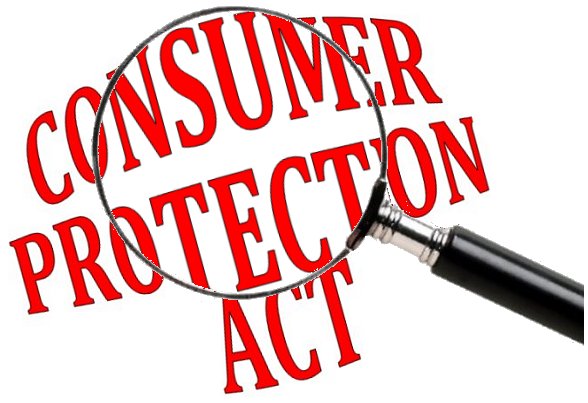Without the consumer, a business would be dead on arrival! Without a consumer, a business can not exist! It is a common saying that the consumer is the king. This is an age long mantra which emphasizes the importance of the consumer to a business. It suggests that consumer satisfaction is of the uppermost importance for the existence of any business. Businesses therefore must strive to meet and ensure that their customers and consumers are highly satisfied. The priority given to customer satisfaction is so important that the need to ensure that the consumer is always satisfied is synonymous with a codified right! This is the origin of consumer protection, the need to protect the customers rights as an end user of a businesss products or services.
As straightforward as the issue of consumer protection seems, it remains a voluminous academic subject encompassing areas such as product defect, product liability, service liability, negligence, quality control, standardization , defences and exclusion or limitation clauses, consumer advocacy and representation etc, etc. This serialized write up shall not examine these academic sub-topics but shall only examine perspectives of consumer protection in reality and in the most simple and basic terms, issues which are relevant in a predominately ignorant clime where there is high display of consumer apathy towards their available and existing rights. Some of these issue are :who is the consumer? What is consumer protection? Does consumer protection exist in Nigeria? Who is the real king in the Nigerian business market-the consumer or the business organization itself ? Are the consumers aware of these ambulant protections in their favour? How are consumers actually protected in some highlighted sectors of the Nigerian business clime? What are the hindrances to achieving an easy consumer protection regime in Nigeria?
Legally defined, a consumer is a person who buys goods or services for personal, family, or household use, with no intention of resale; a natural person who uses products for personal rather than business purposes. The Consumer Protection Council Act, CAP C25 LFN 2004 defines a consumer as an individual who purchases, uses, maintains or disposes of products or services. A customer on the other hand is defined as a person who buys goods or services from a shop or business. A customer buys products from businesses, while a consumer uses the business products .Whereas a consumer buys for ultimate consumption as an end user, a customer on the other hand could only buy for purpose of re-selling. Akin to both of them is the act of buying the product/service. The distinction between the consumer and the customer becomes relevant when determining or tracing the actual liable party, in a situation where the goods or services comes in contact with a long chain of handlers/supplies/distributors before reaching the final consumer.
From the above elucidations so far, consumer protection can be defined as a set of pro-active steps, codes, laws, policies and regulations designed and put in place, most times by the industry regulators, government agencies and authorities, to protect the consumers against unfair trade practices involving consumer goods and services, as well as protect consumers against faulty and dangerous goods or services. The whole gamut of consumer protection is designed to give the consumer a voice, to ensure that the consumer is not at the mercy of the business or service provider.
Pro -active steps designed to ensure consumer protection in Nigeria can be garnered from the several provisions contained in various laws creating regulatory commissions, authorities or councils, containing protective provisions enacted either to protect specific type of consumers or protecting all consumers in general. Thus a cursory gleaning of some of the following laws will reveal some measures and contents of consumer protection. Some of these are Nigerian Broadcasting Commission Act, the Nigerian Civil Aviation Act,the Standards Organization of Nigeria Act, the National Agency for Food and Drug Administration and Control (NAFDAC) Act, the Nigerian Communications Commission Act ,the Food and Drugs Act, the Counterfeit and fake Drugs and Unwholesome Processed Food (Miscellaneous Provisions) Act, the Food, Drugs and Related Products (Registration) Act, the Price Control Act, the Weights and Measures Act, the Trade Malpractices (Miscellaneous Provisions) Act, the Pharmacists Council of Nigeria Act, the Tobacco Smoking Control Act, the Dangerous Drugs Act and the National Drug Law Enforcement Agency Act and a host of others.
The specific mandate of consumer protection in general is currently borne by the Consumer Protection Council (CPC) established by the Consumer Protection Council Act 2004( soon to be replaced by the Federal Competition and Consumer Protection Bill 2017).The CPC was established to provide ample systemic governmental control and protection for consumers.
The main functions of the CPC amongst others are to: Provide speedy redress to consumers complaints through negotiation, mediation and conciliation; Seek ways and means of removing or eliminating from the market hazardous products and causing offenders to replace such products with safer and more appropriate alternatives; Publish from time to time, the list of products the consumption and sale of which have been banned, withdrawn, severally restricted or not approved by the Federal Government or foreign governments, Cause an offending company, firm, trade, association or individual to protect, compensate, and provide relief and safeguard to injured consumers or communities from adverse effects of technologies that are inherently harmful, injurious, violent and highly hazardous;
The CPC is further mandated to organize and undertake campaigns and other forms of activities that will lead to increased public consumer awareness; Encourage trade, industry and professional associations to develop and enforce in their various fields quality standards designed to safeguard the interest of consumers; Issue guidelines to manufacturers, importers, dealers and wholesalers in relationship to their obligation under this Act; Encourage the formation of voluntary consumer groups or associations for consumers well being; Ensure that consumers interest receive due consideration at appropriate forums and provide redress for obnoxious practices or unscrupulous exploitation of consumers by companies, firms trade associations or individuals; Encourage the adoption of appropriate measures to ensure that products are safe for either intended or normally safe use.
The Council receives the complaint of Consumers for redress in a written form through its State Committee and conducts an enquiry into the complaint. Where it is found that the right of a consumer has been violated, the Committee may impose a redress course on the violator. This is without prejudice to the right of the victim in a civil action in a court of competent jurisdiction.
The Council has the power to obtain a satisfactory written assurance from any person or business from whom it appears to conduct acts or activities which portend danger to the community. Thus, any individual who has reasonable cause to believe in the inherent danger of the acts or activities of any person or business can cause a complaint to be written to the state committee who has the duty to investigate the complaint and stop or annihilate risks portended from such dangerous acts or activities of any person or business. Thus, whether before or after the right of a consumer has been infringed, the consumers right is secured under the Act.
Other means of consumer protection in the CPC Act include the criminality of issuing a wrong advertisement about a consumer item. Also, any violation of an Order of the Council is an offence. The Court of law is empowered to make a Compensation Order to any aggrieved individual. It is not farfetched to decipher that the court of competent jurisdiction to entertain matters under this provision is the High Court of a State or the Federal High Court.
The Federal Competition and Consumer Protection Bill 2017,awaiting presidential assent ,is very unique in the sense that it tackles the issue of trade malpractices headlong and codifies the rights of the consumer in an unambiguous form. One wonders why the Bill is still awaiting assent months after being passed by the National Assembly!
The provisions of the above incoming Act which will apply to all undertaking and all commercial activities within or having effect within Nigeria (section 1), establishes a Federal Competition and Consumer Protection Commission, which commission, headed by an Executive Chairman, shall be independent in the exercise of its functions, powers duties and responsibilities (section 3). The commissions functions amongst other are: enforcement of the provisions of the Act, protection and promotion of the consumers interest, resolve disputes or complaints issue and apply sanctions where necessary, ensure that consumers interest receive due consideration at appropriate fora and provide redress to obnoxious practices or unscrupulous exploitation of consumers by companies, firms, trade associations or individuals (section17).
Other unique provisions of the incoming Act are the establishment of the Competition and Consumer Protection Tribunal to adjudicate over conducts prohibited under the Act (section 39) and hear appeals from or review the decisions of the commission (section 48), prohibition of agreements in restraint of competition (section 60), prohibition of agreements containing exclusionary provisions (section 62), commissions power to investigate a monopoly to determine its extent ( section 77), declaration of price regulations (section 89), approval of mergers by the commission (section 94), specific offences against competition (sections 108-114), duties of manufacturers ,importers, distributors and suppliers of goods and services (sections 135-146).
The crux of the impending Act is contained in sections 115-132 which specifically states the rights of the consumer thus: right to information in plain and understandable language(section 115),disclosure of price of goods or services (section 116), product labelling and price description(section 117), disclosure of re-conditioned or second hand goods(section 118), sales records(section 119), right to select suppliers(section 120), consumers right to cancel advance reservation, booking or order (section 121), rights to chose or examine goods(section 122), consumers right to return goods (section 123), manufacturer not to make false representation ( sections 124 and 126), right to fair dealing ( section 125), rights pertaining to the quality and safety of goods and services ( section 131) and consumer right to safe, good quality goods (section 132).The procedure steps for the enforcement of these consumer rights are highlighted under sections 147-156 of the bill.
To the question whether consumer protection exist in Nigeria, the obvious answer from the elucidations above, is a big yes! The next series of this study shall examine consumer protection in some sectors of the Nigerian business clime such as banking, mass communication and aviation
By Theophilus Orumor Esq.
Orumor is a Solicitor with The Law House and can be reached via [email protected] ,08067160654.


